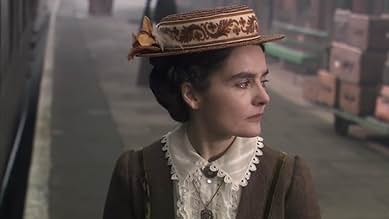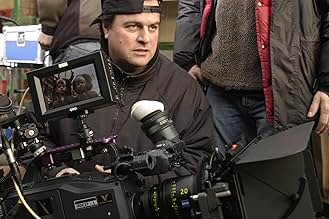Aggiungi una trama nella tua linguaThis docudrama examines the history of scientific discovery that lead up to Albert Einstein's famous equation E=mc2 and its aftermath in the creation of nuclear energy. This includes Faraday... Leggi tuttoThis docudrama examines the history of scientific discovery that lead up to Albert Einstein's famous equation E=mc2 and its aftermath in the creation of nuclear energy. This includes Faraday's discovery of electromagnetic fields; Antoine Lavoisier's discovery that mass is never l... Leggi tuttoThis docudrama examines the history of scientific discovery that lead up to Albert Einstein's famous equation E=mc2 and its aftermath in the creation of nuclear energy. This includes Faraday's discovery of electromagnetic fields; Antoine Lavoisier's discovery that mass is never lost; and Emilie du Chatelet's demonstration that Newton's calculation of the velocity of a... Leggi tutto
- Regia
- Sceneggiatura
- Star
- Humphry Davy
- (as Sam West)
- Professeur Fritz Muhlberg
- (as Mike Sarne)
Recensioni in evidenza
I believe there are psychological sex differences, but we can't settle on what they are. That which is statistically measured (e.g., responses to questionnaires) may be trivial. Or the difference may be of great and obvious universal significance (e.g. anatomical and motivational aspects of the sex act).
Considering the obstacles to intellectual achievement and communication, that women were depicted in the program is a tribute to what may ultimately turn out to be a true statistical female intellectual superiority. There are some signs of it among school children. Or there may not be. It is hard to hold impinging variables constant. One thing is certain: women have been more capable than formerly they were almost universally believed to be.
In addition to social obstacles there was our dangerous biological role (which is much safer today). But what is allowable or encouraged differs greatly in different parts of the world. It has also changed greatly during the seven decades of my lifetime in this culture.
What is it about? Well, it is not a biography of Einstein, as the title might make you think. It is a history of the idea of E=mc2 and where is came from. Einstein is just a cog in an angrenage of people that made it possible.
What is even better is that the science is made accessible and not just story told. It was a small revelation, but a revelation nonetheless, when the narrator asked "if you put pore energy into the movement of an object it moves faster, but it cannot move faster than the speed of light, no matter how much energy you put in. WHERE does the energy go?" and I finally understood why things have to get heavier as they reach the speed of light.
As for the role of women as brainy visionaries, why not? As long as the story is accurate, the empowerment of women as a byproduct is irrelevant.
After Benjamin Franklin's discovery of static electricity, the whole European science communities has begun working on the equations of force and mechanics. The plot grounds on Einstein's understanding of universe and how he differs from any scientist in the world. His courage of discovering the unknown and analyzing the inconceivable unites the Energy and the Mass, that no one could ever think of it. Einstein inspires from Michael Faraday, the founder of Electromagnetism and from James Clark Maxwell, the founder of the Celeritas(the speed of the light).
The plot makes the huge mistake with not mentioning Thomas Edison for the development of the storage of the electricity and the static light. However on the book the writer David Bodanis talks about Voltaire and Edison upon the same issue. Again without mentioning the Einstein's development of Quantum Mechanics, the plot takes us to the invention of Nuclear Fission by unlocking the Uranium atom, and thus to the Manhattan Project and the World War-II.
I found the storyline in such a mess, while trying to reveal Einstein's way of inspiration. It denies itself for the reason on the Light's traveling motion in space that is the square of its speed developed in numbers by a French academic 50 years before Einstein's developing the idea of taking the square measurement of light in order to find its motion in space. How could you develop a scientific thesis if its already accepted as a law 50 years before your thesis? As I know, no one else has ever thought of the light using it in a mathematical equation before Einstein. Anyway omitting this fallacy, I was fond of the explanation that the energy of an object can be described by its mass. It's said that the energy of an object equals to its mass multiplied by the square of the speed of the light. Because the rest is a mess, this documentary could have been a short film, if there would have been adequate personification of the characters introduced. Even though, it sure still is worth watching; and can fill out your expectations.
I can imagine this film as an excellent introduction to modern physics and the history of science for middle school and high school students, as well as a basis for further reading by curious adults. I doubt that either Johnstone or Bodanis intended their work as an in-depth exploration of Einstein or his predecessors. This documentary shouldn't be held to that standard. It's for novices.
One quibble that probably will result in my hanging: The treatment of women in this documentary smacks of "women's studies" and the politically correct. Emilie du Châtelet was no doubt a brilliant woman who tried to make the most of the limited intellectual opportunities that women could pursue in early 18th-century France; but one wonders how much more influential she was on the course of the development of physics than, say, Newton or Leibniz. Marie-Anne Lavoisier was no doubt of great assistance to her husband, but his intellectual achievements in chemistry were essentially his own. Lise Meitner no doubt had to face a double whammy of being a woman in male-dominated academia as well as being Jewish in Hitler's Germany, and no doubt Otto Hahn didn't do enough after World War II to promote recognition of her achievements; but the depiction of their relationship in the film is, from what limited research I've done so far, open to dispute. (Yes, I need to do more research.) When Maleva Maric offers to check Einstein's math, I took it more as a wry commentary on her rather unimpressed attitude about being married to a genius, than any indication of an instrumental role in formulating Einstein's theories. No doubt (again!) he greatly benefited from her support, but does that make her a collaborator? With the exception of Meitner (who truly hasn't received enough credit for her work), the portrayals of the women in this film as somehow instrumental in the development of the ideas that would become the Theory of General Relativity and particle physics seem overstated, a sop to the current fashions of history and academia. The problem is not that there haven't been brilliant and talented women before the late 1900s; but that for all their brilliance and talent, the male-dominated cultures of their times prevented such women from having much opportunity to influence the development of science. Going back and recognizing them now is justice, but historians like Johnstone and Bodanis shouldn't overemphasize the significance of their work, as he does here, especially with Chatalet. Young women of today need all the encouragement they can get to go into intellectual and scientific occupations, but not at the price of distorting historical fact.
One other thing: I find the reference elsewhere among the other comments about this film having "more substance to ... someone from America" quite offensive. I'm sure everyone at the CERN (Western Europe's principal particle physics research facility) will be bored by this movie; of course, there were in 2003 more Americans working there than there were Europeans working at similar facilities in the United States. And of 129 Nobel physics laureates since World War II, only 55 percent were United States natives, or earned the prize for work done in the United States. Sorry, the United States has several things to answer for at present -- but a general slur on the intellect or education levels of U.S. residents is bigoted and inappropriate. This is not a film for physicists, but for those of us who would like to understand their passion for what they do.
ADDENDUM: Re: the comment by "mireillebelleau." I doubt that she and I have anything to disagree about, really. The point that I was trying to make (and may not have made clearly) is that in the context of THIS film -- which ostensibly deals with the development of Einstein's Theory of General Relativity and of modern physics generally -- the INFLUENCE of Emilie du Chatelet's work seems exaggerated. Emilie was undoubtedly a brilliant woman, and had she lived in a more enlightened Enlightenment, she would not have suffered the professional restrictions that her society imposed. But she did suffer those restrictions, and that meant that her accomplishments, however brilliant, were largely lost on the other scientists of her time. Later generations of scientists, in the late 18th,19th, and early 20th centuries, seem to have neglected her altogether -- until more recent scholars began making a conscious and conscientious effort to rediscover the work of Chatelet and women like her. Again, the issue is not the quality or originality of her work, but the impact she had on subsequent physicists, down to Einstein. I would argue that, in the context of this film, the case for her profound influence is not made.
But enough of all those things. For as long as I remember, Albert Eistein was this slow-learner as a child but then went on to achieve later in life of what is probably one of the world's most famous equation in the history of science.
So imagine it was a real eye-opener to me as to how he really got his equation as I watched the show. It was pretty amazing that learning from what others did, he improved on it and it eventually led to the equation all of us knew since. As my knowledge on physics is very basic, it can be a little hard just to read the dry texts on my past Physics textbook. But when this was aired some time back here, it was something I so want to watch. Though I never study in my Physics syllabus about the famous equation, I had learnt and heard about its legacy to the world nowadays through my father who is more aware of it. It was mentioned on the show too.
Other than how Eistein got the equation, it even touched about his private life as well. Another aspect where it opened my eyes as well.
My final say? It's just basically what I had given the title to this review.
Lo sapevi?
- QuizThe movie was made to commemorate the 100th anniversary of the publication of Albert Einstein's paper in which he first outlined the theory of relativity.
- ConnessioniFeatures Nova: E=mc²: Einstein's Big Idea (2005)
I più visti
Dettagli
- Data di uscita
- Paesi di origine
- Siti ufficiali
- Lingua
- Celebre anche come
- Einstein's Big Idea
- Luoghi delle riprese
- Aziende produttrici
- Vedi altri crediti dell’azienda su IMDbPro



























